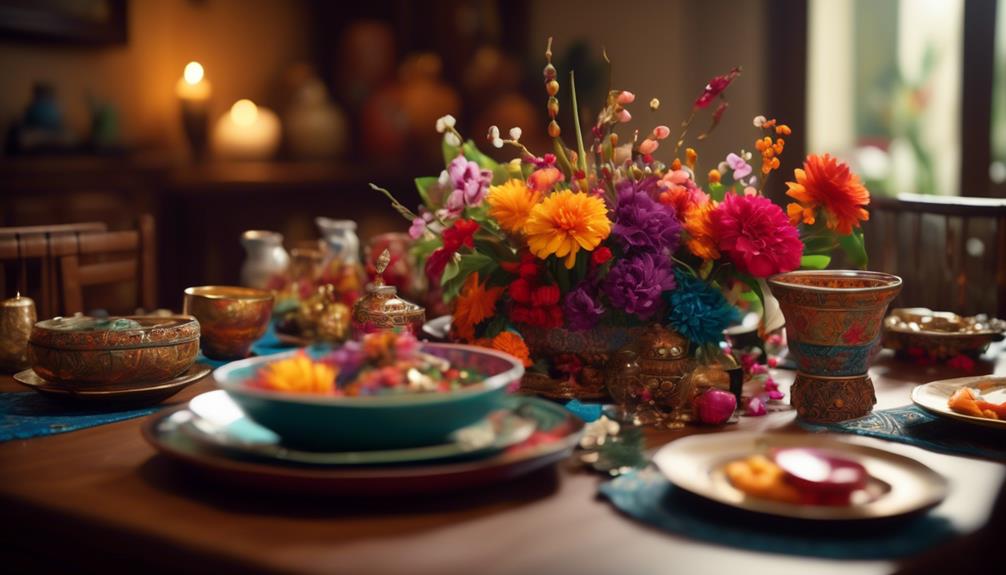How to Establish New Traditions in Multicultural Families

Establishing new traditions in multicultural families is essential to honor and embrace diverse cultural backgrounds. This helps in fostering unity and creating lasting memories. By learning practical strategies to navigate this complex terrain, families can create a stronger, more vibrant family dynamic.
Creating new traditions allows family members to come together and celebrate their different cultural heritages. This can involve incorporating traditional foods, music, and customs into family gatherings and holidays. By doing so, family members can learn about and appreciate each other's cultural backgrounds.
It is important to involve all family members in the process of creating new traditions. This ensures that everyone feels included and valued. By giving each person a voice and allowing them to contribute their ideas, the traditions become a true representation of the family's multicultural heritage.
In addition to celebrating specific cultural traditions, it is also important to create new traditions that are unique to the multicultural family. These can be activities or rituals that bring the family together on a regular basis. This could include weekly family game nights, monthly family outings, or annual family vacations.
By establishing new traditions in multicultural families, the family dynamic becomes enriched and strengthened. These traditions provide opportunities for family members to connect with each other and create lasting memories. They also help to create a sense of belonging and pride in one's cultural heritage. Overall, embracing and celebrating diverse cultural backgrounds through traditions is a powerful way to foster unity and create a vibrant family dynamic.
Embrace Cultural Diversity
Embrace cultural diversity in your family by actively engaging with and celebrating the various traditions, customs, and perspectives of different cultures.
In today's global society, it's essential to foster cultural exchange and embrace multicultural experiences within your own home. By doing so, you not only enrich your family's understanding of the world, but also promote tolerance, empathy, and open-mindedness.
To truly embrace cultural diversity, it's crucial to actively seek out opportunities for cultural exchange. Encourage your family members to participate in activities that allow them to engage with different cultures, such as attending multicultural festivals, trying out diverse cuisines, or even hosting international students. These experiences provide a firsthand understanding of the richness and beauty of different traditions, fostering a sense of appreciation and respect.
Celebrating multicultural experiences can be as simple as incorporating elements from different cultures into your daily life. Decorate your home with artwork or artifacts from various parts of the world, or learn traditional dances or songs together as a family. By actively engaging with different cultures, you're creating an environment that celebrates diversity and encourages learning from one another.
Research Family Backgrounds
To truly understand and appreciate the multicultural experiences in your family, it is imperative to delve into the research of your family backgrounds. By exploring your family histories and cultural heritage, you can gain invaluable insights into the traditions, customs, and values that have shaped your family's identity.
To help you get started, here is a table that you can use to organize and document the information you gather:
| Family Name | Country of Origin | Traditions | Language | Cultural Significance |
|---|---|---|---|---|
| Smith | Ireland | St. Patrick's Day celebrations | Gaelic | Celebrating Irish heritage |
| Kim | South Korea | Seollal (Lunar New Year) | Korean | Honoring ancestors |
| Lopez | Mexico | Dia de los Muertos (Day of the Dead) | Spanish | Remembering and celebrating deceased loved ones |
| Singh | India | Diwali (Festival of Lights) | Hindi | Celebrating the victory of light over darkness |
| Nguyen | Vietnam | Tet Nguyen Dan (Lunar New Year) | Vietnamese | Family reunions and honoring ancestors |
You need to stop wasting time and start identifying the shared values in your multicultural family.
Look for cultural commonalities that can bring you together and strengthen your bond.
Don't ignore the core family beliefs that unite you, even if they may seem controversial to others.
Cultural Commonalities
Shared values are the cornerstone of cultural commonalities in multicultural families, binding them together and shaping their identities.
In a world where cultural exchange and intercultural communication are increasingly important, it's essential to identify and embrace the shared values that can bridge the gaps between different cultures. By recognizing the common ground, you can create a strong foundation upon which to build new traditions in your multicultural family.
It may require open and honest conversations, challenging the norms and beliefs that may have been ingrained in your respective cultures. However, by finding shared values, you can establish new traditions that honor and respect each culture while creating a unique blend that reflects the diverse backgrounds of your family.
Embracing cultural commonalities isn't about assimilation, but rather about celebrating the richness that comes from different perspectives and experiences.
Core Family Beliefs
Building upon the foundation of cultural commonalities, the next step is to uncover the core family beliefs that serve as the bedrock of shared values. These core family values are the principles and ideals that guide your family's actions and decisions. They shape your traditions and define what is important to you as a family. Identifying and embracing these core values is crucial in passing down traditions to future generations.
To help you identify your core family beliefs, consider the following table:
| Core Family Values | Examples |
|---|---|
| Respect | Treating others with kindness and empathy |
| Integrity | Being honest and true to oneself |
| Unity | Supporting and standing up for one another |
| Gratitude | Appreciating the blessings in life |
Create Fusion Traditions
Blending cultural customs in multicultural families can create a sense of identity crisis and confusion.
By incorporating diverse celebrations, you risk diluting the significance and meaning of each tradition.
And while combining food traditions may seem like a way to bridge cultural gaps, it can also lead to a loss of culinary authenticity and the erasure of cultural heritage.
Blending Cultural Customs
Incorporate elements from both cultures to create unique and captivating fusion traditions in your multicultural family. Blending cultural customs can be a powerful way to foster intercultural communication and intergenerational exchange. Here are three ideas to help you get started:
- Combine traditional recipes:
Create a delicious fusion cuisine by incorporating ingredients and cooking techniques from both cultures. This not only allows you to enjoy the flavors of both backgrounds but also encourages intergenerational exchange as older family members can pass down their traditional recipes.
- Celebrate holidays in a new way:
Blend customs and rituals from both cultures to create your own unique holiday traditions. This can be a wonderful opportunity for intercultural communication as family members share the significance and symbolism behind their customs.
- Create art and crafts:
Encourage creativity by incorporating elements from both cultures into art and craft projects. This not only allows for intergenerational exchange as older family members can teach traditional techniques but also fosters a sense of pride and appreciation for both cultural heritages.
Incorporating Diverse Celebrations
Now let's dive into the exciting realm of creating fusion traditions by incorporating diverse celebrations in your multicultural family.
Intercultural storytelling is a powerful tool that can help bridge the gaps between different cultural backgrounds. By sharing stories from each culture, you can create a shared narrative that celebrates the diversity within your family.
Language and communication also play a crucial role in incorporating diverse celebrations. Encourage family members to learn and use phrases or greetings from different languages during celebrations. This not only fosters a sense of inclusivity but also helps everyone feel valued and respected.
Combining Food Traditions
Get ready to shake up your taste buds and challenge culinary norms as you embark on the delicious journey of combining food traditions in your multicultural family. It's time to break free from the monotony of traditional dishes and create fusion dishes that will leave your guests begging for more.
Here's how you can do it:
- Recipe exchange: Swap recipes with members of different cultures in your family. This won't only allow you to learn new cooking techniques but also foster a sense of unity and appreciation for each other's heritage.
- Fusion dishes: Combine ingredients and cooking styles from different cultures to create unique and exciting dishes. Mix flavors, experiment with spices, and let your creativity run wild.
- Embrace controversy: Embracing controversy means challenging the status quo and pushing boundaries. Don't be afraid to mix ingredients that might seem unconventional. Remember, great culinary discoveries were made by those who dared to be different.
Involve Everyone in the Process
Make sure everyone in your multicultural family is actively involved in the process of establishing new traditions. Including everyone in this journey is crucial to fostering a sense of belonging and creating a harmonious multicultural environment. Encouraging participation allows each family member to contribute their unique perspectives and experiences, ensuring that the traditions formed are representative of the diverse backgrounds within your family.
To involve everyone, start by holding regular family meetings to discuss the creation of new traditions. Give everyone the opportunity to share their ideas, opinions, and desires. This open forum encourages active participation and ensures that everyone feels heard and valued.
Assign specific tasks and responsibilities to each family member. This not only promotes a sense of ownership but also fosters collaboration and teamwork. For example, one family member could be in charge of organizing cultural events, while another could be responsible for researching and sharing information about different cultural practices.
Additionally, consider implementing a rotating system where each family member gets to choose and plan a tradition that reflects their culture or interests. This allows for a fair and inclusive approach, ensuring that everyone's heritage is celebrated.
Incorporate Food and Cuisine
Incorporate the vibrant flavors and culinary traditions of different cultures into your family's traditions. Food has the power to bring people together and celebrate diversity. Don't be afraid to experiment with food fusion and create unique dishes that blend different cultural cuisines. Embrace cultural integration through the meals you share with your loved ones.
Here are three ways to incorporate food and cuisine into your multicultural family traditions:
- Host a monthly international dinner night where each family member gets to choose a recipe from their cultural background and share it with the rest of the family. This not only exposes everyone to different flavors but also encourages learning and appreciation of each other's heritage.
- Take family cooking classes that focus on different cultural cuisines. This hands-on experience won't only teach you new recipes and cooking techniques but also deepen your understanding of different cultures.
- Plan a yearly cultural potluck where friends and neighbors from different backgrounds bring dishes representing their heritage. This creates a sense of community and allows everyone to exchange recipes and stories.
Celebrate Festivals and Holidays
Embrace the cultural diversity in your family by immersing yourselves in the vibrant celebrations of festivals and holidays. Celebrating festivals and holidays from different cultures is a powerful way to connect with your heritage and create new traditions. It's time to break away from the monotony of the same old celebrations and explore the rich tapestry of multicultural festivities.
One way to celebrate festivals and holidays in a multicultural family is by incorporating multicultural recipes into your meals. Take the time to learn about the traditional dishes from each culture represented in your family and try your hand at cooking them. Not only will this allow you to experience the flavors and aromas of different cuisines, but it will also provide an opportunity for shared learning and bonding.
In addition to enjoying multicultural recipes, engaging in cultural holiday activities is another fantastic way to celebrate diversity within your family. Research and participate in the unique customs and traditions associated with different festivals and holidays. Whether it's decorating a Christmas tree, lighting candles for Diwali, or playing traditional games during Chinese New Year, these activities will deepen your understanding of each other's cultures and create lasting memories.
Document and Preserve Traditions
Now let's explore the crucial task of preserving and documenting the traditions in your multicultural family. It's imperative to document customs and preserve heritage so that future generations can understand and appreciate their cultural roots. Here are three key points to consider:
- Record and Preserve: Take the time to document your family's customs and traditions. Write them down, create a scrapbook, or even make a video. By preserving these valuable elements of your heritage, you ensure that they aren't lost or forgotten over time.
- Pass It On: Share your documented traditions with your children and other family members. Teach them about the significance and meaning behind each custom. This way, they can carry on these traditions and pass them down to future generations.
- Connect with Others: Seek opportunities to connect with other multicultural families and exchange traditions. By sharing and learning from one another, you can enrich your own family's traditions and create new ones that reflect the diverse backgrounds of your loved ones.
Preserving and documenting your multicultural family's traditions is a meaningful way to honor your heritage and create a strong sense of identity. It allows you to pass down the richness of your culture to future generations, ensuring that your customs and traditions are celebrated and cherished.
Frequently Asked Questions
How Can I Introduce My Cultural Traditions to My Multicultural Family?
You can introduce your cultural traditions to your multicultural family by creating a fun and inclusive environment. For example, you could host a themed dinner night where everyone brings a dish from their culture and shares its significance. This way, you can integrate cultural practices while celebrating diversity.
What Are Some Ways to Research and Learn About My Family's Cultural Backgrounds?
To research and learn about your family's cultural backgrounds, start with genealogy research. Dig into your family tree, connect with relatives, and gather information. Explore your cultural heritage by studying traditions, customs, and history.
Identifying and establishing shared values in your multicultural family can be challenging, but it's essential for harmony and understanding. Dig deep into your beliefs, communicate openly, and be willing to compromise.
What Are Some Creative Ideas for Creating Fusion Traditions That Blend Multiple Cultures?
Want to create fusion recipe ideas that incorporate cultural symbols? Mix different dishes and flavors from your cultures to create unique and delicious meals. Blend traditions together to form new ones that celebrate your diverse heritage.
How Can I Involve and Engage Everyone in the Process of Establishing New Traditions in My Multicultural Family?
To involve and engage everyone in establishing new traditions in your multicultural family, prioritize effective communication. Ensure everyone feels heard and included by embracing and appreciating each family member's unique cultural heritage.











